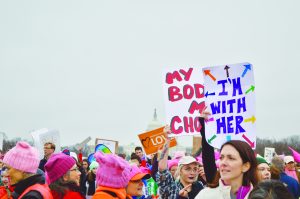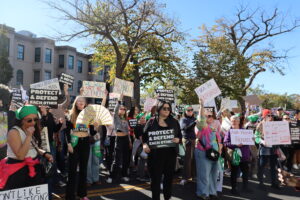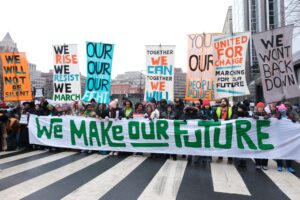“This is what democracy looks like!” dozens of sign-toting demonstrators shouted as they marched from Freedom Plaza to the Supreme Court as part of Washington, D.C.’s fifth annual Women’s March. These demonstrators and thousands of others gathered on Saturday, October 2 in protest of the recent surge in laws around the country restricting abortion.
Roughly 10,000 demonstrators attended the “Rally for Abortion Rights” and accompanying march, according to Women’s March organizers. Other cities, including Atlanta, Philadelphia, and Austin hosted their own marches on the same day.
Fiana Arbab, a Michigan native who now resides in D.C., was among the unofficial leaders of the march, initiating chants and rallying those around her in the crowd. She was the youngest board member of Women’s March of Michigan and is now an advocacy fellow for Oxfam International, an anti-poverty non-governmental organization.
“When we heard about the law being passed in Texas banning abortion rights and reproductive injustice, we knew we had to come back and uplift the platform,” Arbab said, referencing the recent Texas law banning nearly all abortions and offering rewards for informants who report those seeking or assisting others seeking an abortion.
The law was a motivator for many demonstrators. In her speech on the stage at Freedom Plaza, Cristela Alonza—comedian, Texas native, and official host of D.C.’s Women’s March—expressed frustration with the abortion ban.
“We hear, ‘don’t mess with Texas.’ Well guess what, Texas? We’re here because we have to mess with you,” she said to the crowd.
At the start of the long day of protest, the National Council of Jewish Women held a faith service, including leaders from various other faith traditions. Rabbi Tamara Cohen and Kohenet Keshira haLev Fife led the service, during which they guided the audience in numerous Jewish songs and prayers focused on bodily autonomy and reproductive rights.
When asked how her faith informs her beliefs about reproductive justice, haLev Fife said, “My faith doesn’t just inform it, it demands it.”
Despite the overwhelming peace of the congregation, the service was met with opposition by pro-life protesters.
“You are a fake Rabbi. You are hypocrites of the highest order,” said one counter-protester during prayers. Whenever these interruptions occurred during the service, participants and service leaders drowned out the voices of the opposition, clapping and singing in unison.
Following the Shabbat service, Reverend Lyonne Briggs spoke of the Texas abortion ban’s effect on Black Southern women and people of all marginalized genders, addressing the intersection of reproductive injustice with issues of racism, nationality, class, sexuality, and gender.
“We hold in our bodies the struggle of those whose sense of physical safety and bodily autonomy has been diminished, decayed, destroyed by the brutality of misogyny, of trans- and homophobia, of racialized capitalism,” Briggs said.
The main event of the rally focused on how reproductive rights impact marginalized groups. Speakers included Schuyler Bailar, a Division I swimmer and advocate for the transgender community, and Hope Khodaei, a member of the Indigenous Piscataway people who led a rendition of the “Women Warrior Song.”
“My name is Hope but my native name is Méchësa, which means ‘fire starter,’ and I’m here to start a fire,” said Khodaei.
While demonstrators in the crowd expressed a variety of specific motivations for attending the rally and march, but all expressed the desire to protect reproductive rights in the U.S.
Lauryn Ping (COL ‘23) said that protecting abortion rights motivated her attendance at the march and her leadership role in H*yas for Choice (HFC), Georgetown’s pro-choice club. She and Rebecca Glickman (COL ‘23) are co-organizing directors of HFC and coordinated a group of Georgetown students to attend the rally and march.
“As a college student, I don’t think I would be able to take care of a child at this point in my life, and I think having the ability to get an abortion if I need it, as well as access to contraception, it’s so important,” said Ping.
Demonstrator Katherine Johnson arrived at the march wearing a judge’s robes. Her sister, Lauren Biggs, wore white robes and a blindfold and had a balancing scale in her hands. They were dressed as the late Ruth Bader Ginsberg and blind Lady Justice, respectively, they explained in an interview with the Voice.
“Anybody with a uterus is affected at this point,” said Johnson. “The Supreme Court is getting ready to meet in a few days and we want to make sure they know all of these people and all the people that they left at home have a stake in this.”
The sisters drove from Raleigh, North Carolina to attend the march and rally, motivated by the abortion ban in Texas.
“It’s just insane,” said Biggs. “Six weeks. You hardly even know you’re pregnant usually, so my heart goes out to those women, and we’re going to fight all the way.”
Susan Craig, the Chief Operating Officer for birth control company Pandia Health, arrived at the rally wearing a black robe adorned with condoms. Craig’s mother had created the costume for her, and she cited her own college-age daughters were her reason for marching in the costume in an interview with the Voice.
“I’m here to represent women’s rights and to stand up. I cannot be quiet. I cannot let my daughters lose the privileges that I had,” she said.
But not all symbols displayed by participants were wholly embraced by all those involved in the march. Some posters and banners showed coat hanger imagery, which organizers had advised against the use of in email communications.
“No coat hanger imagery. We do not want to accidentally reinforce the Right-wing talking points that self-managed abortions are dangerous, scary, and harmful,” read one official Women’s March email.
For some protesters, however, this symbol sends an important message on the dangers of banning abortions.
“This is something that in the horrible times of the past women had to use to have an abortion. And so we’re smashing the coat hanger and saying, we refuse to ever use this again. We won’t go back,” said Morgan Artyuahina, who marched with a banner displaying a broken coat hanger.
Arbab, whose work in grassroots activism inspired her active role in the demonstration, hopes that the rally and march on Saturday will bring about further pro-choice activism across the country.
“I really want to make sure that we don’t lose out on that momentum and the opportunity to uplift our voices,” she said.






